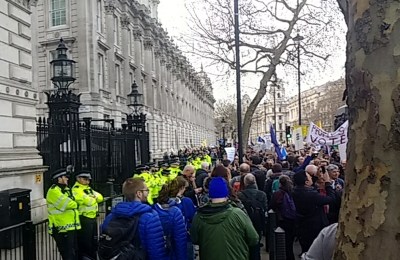In a completely unexpected move, the British Prime Minister Theresa May yesterday announced outside Number 10 Downing Street that the UK would resume its space launch programme, 47 years after its cancellation following the launch of the Prospero satellite. She outlined a bold plan with a target of placing the Doc Martens of a British astronaut on the Lunar surface as early as 2024. Funded by the £350m per week Brexit windfall, the move would she said place the country at the forefront of a new 21st century Space Race with the North Koreans.
An estimated 2 million jubilant supporters took to the streets of London at the news, bringing the capital to a halt as they paraded with colourful banners from Hyde Park to Trafalgar Square and down Whitehall past her Downing Street home. Meanwhile the value of shares in the popular British high street bakery firm Patisserie Gregoire jumped by 19% as it was revealed that their new vegan sausage roll had in fact been a secret trial of the British astronaut diet.
Wait… There Really Is A British Space Effort?
As you might imagine, here at Hackaday we are enthusiastic about space exploration, and welcome wholeheartedly any news of new initiatives in that direction. But we recognise that in the light of the fast-moving political theatre of Brexit these are turbulent times in which what makes the headlines on April 1st might well have become merely chip wrappers by April 2nd. So to try to make sense of the story and give it some context, we thought we’d take a moment to look at the British space industry as it stands. And with a 5.1% share of the global space economy, a Government-funded UK Space Agency with plans for a spaceport, a host of space related work from the private sector, and some of the world’s more bleeding-edge research, it might come as a surprise to find out just how much of it there is.
It’s difficult to write any story involving the UK in early 2019 though without further mention of Brexit, and the space business is certainly no exception with industry figures expressing concern about its effect. A story that came and went last year was that UK firms would be excluded from contracts associated with the Galileo satellite navigation system. Since a significant proportion of Galileo used British technology and their control centre was in the UK, the Government responded by announcing that it would commission a study into creating their own constellation of navigation satellites. To this end they have committed £92m, a sum which seemed to go down well with the choir but even with the UK’s demonstrable expertise in the field would represent a drop in the ocean compared …read more
Source:: Hackaday

